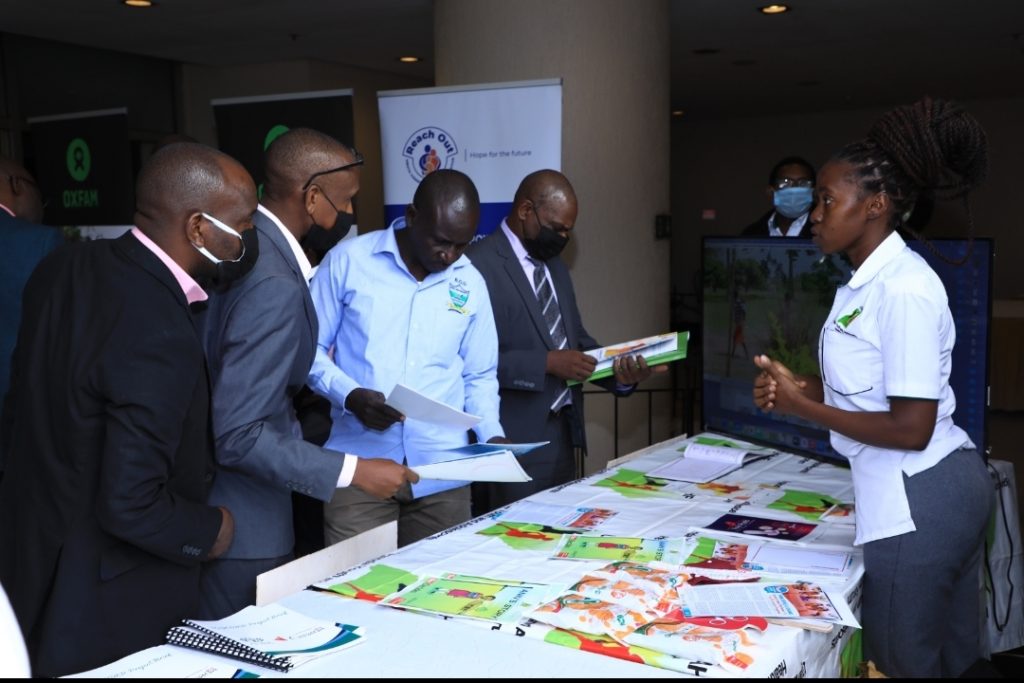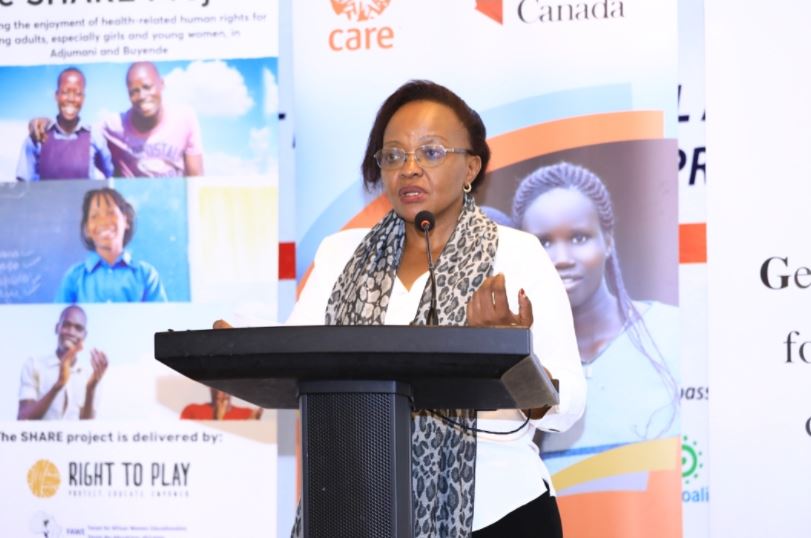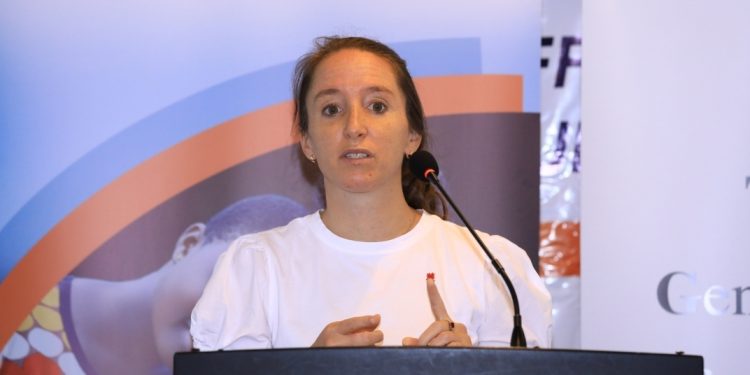Canada, under the Global Affairs Canada has launched 4 health projects aimed at improving the health and rights of women and girls. The projects were launched at the Sheraton Hotel Kampala yesterday at an event officiated by the Commissioner Reproductive Health, Jessica Nsungwa.
GAC, through its partners; CARE Canada, ADRA Canada, Oxfam Canada, and Right to Play International is funding the projects, all contributing to the National Development Plan III (NDP) that is geared towards improving the quality of life of Uganda’s population by harnessing the Demographic Dividend (DD). The projects’ goals are aligned to the Ministry of Health Strategic Plan 2020 – 2025, aimed at reducing Infant/Maternal Mortality as well as reducing fertility and ensuring access to quality integrated Sexual and Reproductive Health services.
Speaking at the event, the minister expressed gratitude towards GAC for its commitment in supporting sexual reproductive health and adolescent rights and skills, gender equality and economic empowerment.

“Young people in Uganda face various sexual and reproductive health risks. The GAC funded projects will help to examine factors associated with comprehensive categories of sexual and reproductive health, including sexual behavior; sexual education and access to contraceptive services; family planning; prevention of STDs; sexual consent as a right; gender-based violence; as well as HIV testing, counselling, disclosure and support,” Nsungwa noted.
She henceforth introduced the new projects as follows;
The SHE SOARS (Sexual and reproductive Health & Economic empowerment, Supporting Out of school Adolescent girls’ Rights and Skills) project to be implemented by CARE Uganda and Restless Development aims at increasing awareness of health-related rights on the part of extremely vulnerable and marginalized women and girls, particularly out-of-school adolescent girls, between 10 and 19 years old. The project will provide training and support for educators and health care providers to ensure that adolescents have access to Sexual Reproductive Health information and services.
Apollo B. Gabazira, CARE International’s Country Director said the joint launch is aimed at improving collaboration among partners working in Sexual Reproductive Health (SRH) and amplify the partners’ voices to achieve greater impact as they advocate for increased access to SRH information and services for young people.

He called upon the government and partners to support ASRH indicators by addressing negative social norms affecting ASRH including strengthening policy action against child, early and forced marriage, addressing policy gaps in relation to access to SRH information and services for adolescents, having meaningful involvement of adolescents in planning and programming for SRHR to meet their needs, and enhancing the delivery of gender/youth responsive, inclusive, and comprehensive adolescent sexual reproductive health services.
The TOGETHER (Uniting Towards Gender Equality for enjoyment of women’s and Girls’ Total Health and Rights) project to be implemented by ADRA aims at increasing the awareness of health-related rights for vulnerable persons, particularly those facing intersectional oppression due to gender or sexual orientation, mental or physical disability or indigeneity. The project will empower individuals and communities to advocate for better sexual and reproductive health services and policies and will educate and encourage young people to engage with their communities and their governments to make their voices heard.
Frank Kiggundu, ADRA Uganda’s Acting Country Director, thanked Global Affairs and ADRA Canada for selecting ADRA Uganda as a trusted partner to make a positive difference in the thousands of lives which the TOGETHER project will empower and vowed to deliver transformational programming through our partnerships with SickKids, Salanga, and ADRA Canada.
The SHARE (Sexual Health and Reproductive Education) project to be implemented by Right to Play aims at increasing the awareness of health-related human rights for the most vulnerable people, particularly adolescent girls, and young women, both in and out of school, between 10 and 24 years old. Through its work alongside local organizations and with communities, the project will systematically empower adolescent girls and young women to take the lead on SRHR advocacy within their communities and their countries.
Sylvia Hope Masika, Programme Manager at Right to Play stated that the five-year program will be implemented in Adjumani and Buyende.
“The program will use a gender-transformative and rights-based approach to support sexual and reproductive health and rights for adolescent youth, particularly girls and young women. The program will leverage the four unique areas of expertise of the consortium members – Right To Play’s Gender-Responsive Play-Based Learning methodology, WaterAid’s expertise in WASH (Water, Sanitation and Hygiene), FAWE’s strong experience in advocacy and policy change, and FHI 360’s girl-focused health service and empowerment methodologies,” she added.
The STAND-UP (Stand Up for Adolescent Girls and Young Women’s Sexual Reproductive Health and Rights) project to be implemented by Oxfam aims at increasing SRHR for the most marginalized and vulnerable people, particularly adolescent girls and young women between 15 to 24 years old, including those with intersecting vulnerabilities due to sexual or gender orientation, or their status as refugees or internally displaced persons. The project will build capacity for SRHR advocacy at the local, national and regional levels.
“All stakeholders are called upon to support this project implementation as we can achieve much together as a team to address SRHR issues affecting women and girls right from homes, the community, national and global levels.’’ Said Mr. Francis Odokorach, Country Director Oxfam.
In 2021, Canada announced funding for over 5 to 7 years, for 11 projects with Canadian health partners globally to support SRHR projects specifically focusing on vulnerable groups, particularly those facing intersectional oppression due to gender or sexual orientation, mental or physical disability or indigeneity, marginalized women and girls, and in and out of school adolescents. The projects will improve the quality of, access to, and demand for integrated health services and information for women, adolescents, and children at the community, health facility, and system levels.
This investment will enable key partners to support the most marginalized children, adolescents, women and girls with comprehensive sexual and reproductive health and rights services as core components of essential health services.
_________________________________________________________________________________
QUICK FACTS ON GLOBAL AFFAIRS CANADA
• Canada is committed to supporting women and girls with access to the full range of sexual and reproductive health services and information. Advancing SRHR includes investing in family planning and modern contraceptives, preventing and responding to sexual and gender-based violence, supporting a woman’s right to choose safe and legal abortion, as well as strengthening national health systems to provide comprehensive SRHR services.
• In June 2019, at the Women Deliver Conference, Prime Minister Justin Trudeau announced a historic, 10-year investment of $1.4 billion annually, starting in 2023, to support the health of women and girls in all their diversity around the world, with $700 million of the annual investment dedicated to sexual and reproductive health rights.
• Global maternal and fetal outcomes have worsened during the COVID-19 pandemic, with an increase in maternal deaths, and stillbirth.
• Due to COVID-19, the United National Population Fund estimates that 12 million women globally have experienced contraceptive access interruptions, leading to 1.4 million unintended pregnancies.
• One in three women worldwide experience physical or sexual violence, and since the outbreak of COVID-19, violence against women and girls has emerged as a shadow pandemic according to UN Women











